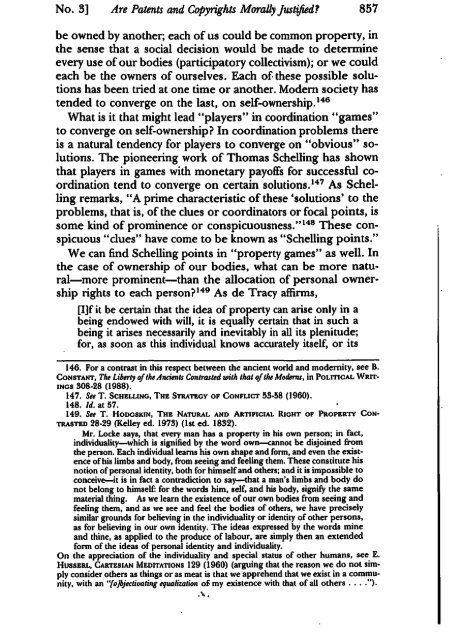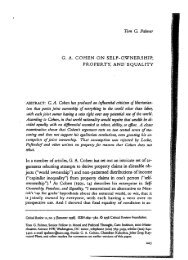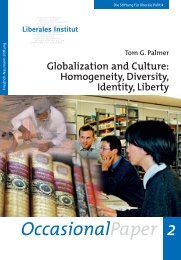Are Patents and Copyrights Morally Justified? - Tom G. Palmer
Are Patents and Copyrights Morally Justified? - Tom G. Palmer
Are Patents and Copyrights Morally Justified? - Tom G. Palmer
You also want an ePaper? Increase the reach of your titles
YUMPU automatically turns print PDFs into web optimized ePapers that Google loves.
No. 3] <strong>Are</strong> <strong>Patents</strong> <strong>and</strong> <strong>Copyrights</strong> <strong>Morally</strong> Justi/led? 857<br />
be ownedby another; each of us could be common property, in<br />
the sense that a social decision would be made to determine<br />
every use of our bodies (participatory collectivism); or we could<br />
each be the owners of ourselves, Each of. these possible solutions<br />
has been tried at one time or another. Modern society has<br />
tended to converge on the last, on self-ownership.’ 46<br />
What is it that might lead “players” in coordination “games”<br />
to converge on self-ownership? In coordination problems there<br />
is a natural tendency for players to converge on “obvious” solutions.<br />
The pioneering work of Thomas Schelling has shown<br />
that players in games with monetary payoffs for successful coordination<br />
tend to converge on certain ~ As Schelling<br />
remarks, “A prime characteristic of these ‘solutions’ to the<br />
problems, that is, ofthe clues or coordinators or focal points, is<br />
some kind of prominence or conspicuousness.” 48 These conspicuous<br />
“clues” have come to be known as “Schelling points.”<br />
We can find Schelling points in “property games” as well. In<br />
the case of ownership of our bodies, what can be more natural—more<br />
prominent—than the allocation of personal ownership<br />
rights to each person?’ 49 As de Tracy affirms,<br />
[I]f it be certain that the idea ofproperty can arise only in a<br />
being endowed with will, it is equally certain that in such a<br />
being it arises necessarily <strong>and</strong> inevitably in all its plenitude;<br />
for, as soon as this individual knows accurately itself, or its<br />
146. Fora contrast in this respect between the ancient world <strong>and</strong> modernity, see B.<br />
CONSTANT, The Liberty ofthe Ancients Contrastedwith that oft/is Moderns, in POLITICAL. WRIT-<br />
INGs 308-28 (1988).<br />
147. See T. SCHEI.LING, THE STRATEGY OF CONFLICT 53-58 (1960).<br />
148. Id. at 57.<br />
149. See T. HODGSKIN, THE NATURAL AND ARTIFICIAL RIGHT OF PRoPERTY CON.<br />
TRASTED 28-29 (Kelley ed. 1973) (1st ed 1832).<br />
Mr. Locke says, that every man has a property in his own person; in fact,<br />
individuality—which is signified by the word own—cannot be disjoined from<br />
the person. Each individual learns his own shape <strong>and</strong> form, <strong>and</strong> even the existence<br />
of his limbs <strong>and</strong> body, from seeing <strong>and</strong> feeling them. These constitute his<br />
notion ofpersonal identity, both for himself<strong>and</strong>others; <strong>and</strong> it is impossible to<br />
conceive—it is in fact a contradiction to say—that a man’s limbs <strong>and</strong> body do<br />
not belong to himself: for the words him, self, <strong>and</strong> his body, signify the same<br />
material thing. As we learn theexistence ofour own bodies from seeing<strong>and</strong><br />
feeling them, <strong>and</strong> as we see <strong>and</strong> feel the bodies of others, we have precisely<br />
similar grounds for believing in the individuality or identity of other persons,<br />
as for believing in our own identity. The ideas expressed by the words mine<br />
<strong>and</strong> thine, as applied to the produce of labour, are simply then an extended<br />
form of the ideas of personal identity <strong>and</strong> individuality.<br />
On the appreciation of the individuality <strong>and</strong> special status of other humans, see E.<br />
HUSSERL, CARTEsIAN MEDITATIONS 129 (1960) (arguing that the reason we do not simply<br />
consider others as things or as meat is that we apprehend that we exist in acommunity,<br />
with an “[oJbjectivating equalization of my existence with that of all others ).











